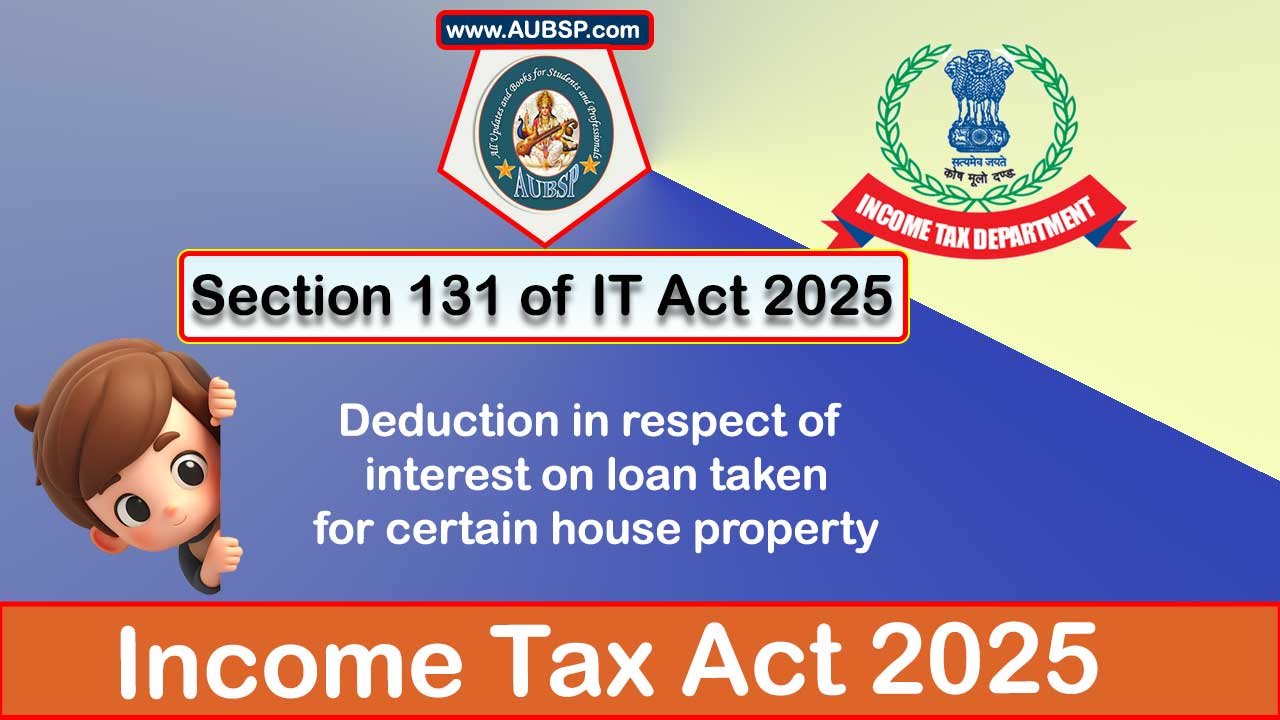Deduction in respect of interest on loan taken for certain house property
[Section-131 as per the Income Tax Act, 2025 (this Act) w.e.f. 1st April, 2026.]
Section 131(1) of Income Tax Act 2025
131(1) An assessee, being an individual not eligible to claim deduction under section 130, shall be allowed a deduction on interest payable on loan taken by him from any financial institution for the purpose of acquisition of a residential house property, subject to a maximum limit of one lakh and fifty thousand rupees in a tax year and on fulfilment of conditions specified in sub-section (2), for the tax year beginning on the 1st April, 2019 and subsequent tax years.
Section 131(2) of Income Tax Act 2025
131(2) The deduction under sub-section (1) shall be subject to the following conditions:—
- (a) the loan has been sanctioned by the financial institution during the period beginning on the 1st April, 2019 and ending with the 31st March, 2022;
- (b) the stamp duty value of residential house property does not exceed forty-five lakh rupees; and
- (c) the assessee does not own any residential house property on the date of sanction of loan.
Section 131(3) of Income Tax Act 2025
131(3) Where a deduction under this section is allowed for any interest referred to in sub-section (1), deduction shall not be allowed in respect of such interest under any other provision of this Act for the same or any other tax year.
Section 131(4) of Income Tax Act 2025
131(4) In this section, “financial institution” shall have the meaning assigned to it in section 130(5)(a).
FAQs on Section 131 of Income Tax Act 2025
Who is eligible to claim deduction under Section 131?
An individual assessee who is not eligible to claim deduction under Section 130 can claim deduction under Section 131.
What is the maximum deduction allowed under Section 131?
A deduction of up to ₹1,50,000 is allowed in a tax year on the interest payable on a home loan.
What type of property qualifies for deduction under Section 131?
The deduction is available for interest on a loan taken to acquire a residential house property.
Is there a time limit for sanction of loan to be eligible under Section 131?
Yes, the loan must have been sanctioned by the financial institution between 1st April, 2019 and 31st March, 2022.
What is the condition regarding the value of the house property?
The stamp duty value of the residential house property must not exceed ₹45,00,000.
Can the assessee own another house at the time of loan sanction?
No, the assessee must not own any residential house property on the date of sanction of the loan.
Can the same interest be claimed under another section also?
No, if interest is claimed under Section 131, it cannot be claimed under any other provision of this Act for the same or any other tax year.
Is the deduction available only for a specific time period?
No, once eligible, the deduction can be claimed for interest payable in the tax year beginning 1st April, 2019 and subsequent tax years, subject to conditions.
What is meant by a ‘financial institution’ under this section?
‘Financial institution’ has the same meaning as assigned in section 130(5)(a) of this Act.
Is this deduction available for a loan taken from a relative or employer?
No, the loan must be taken from a financial institution as defined under the Act.
Can a joint owner of the property claim the deduction under Section 131?
Only if all the conditions of Section 131 are independently fulfilled by the individual assessee.
Is this deduction applicable for renovation or repair of existing house property?
No, the deduction is allowed only for acquisition of a residential house property.
Will the deduction continue if the house is sold?
No, the deduction is available only as long as the conditions are fulfilled, including ownership and usage of the property.
Can this deduction be claimed even if the property is not self-occupied?
Yes, the Act does not restrict the deduction to self-occupied property, but other sections might impose conditions based on usage.


